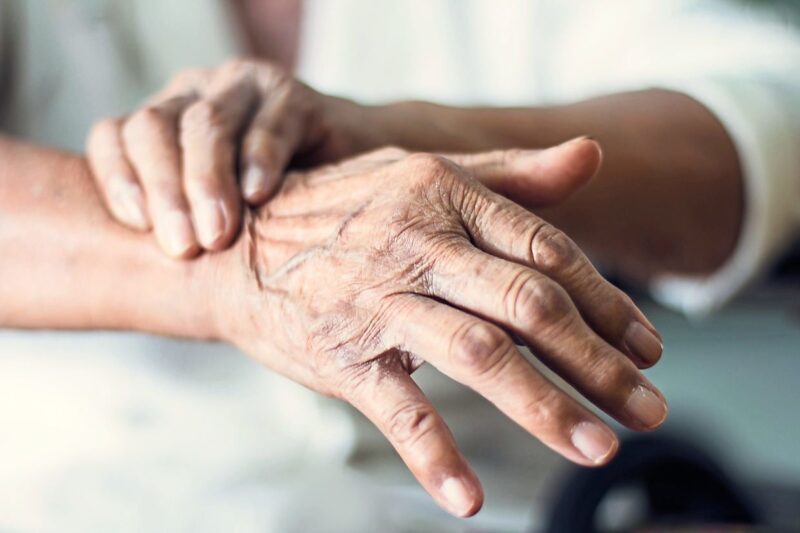On a list of habits that are extremely detrimental to your health, smoking is often on top. Consuming excess caffeine has also been linked with numerous health issues. From insomnia and headaches to nervous bouts and heightened irritability, the list is rather exhaustive.
Therefore, it is recommended by the Food and Drug Administration (FDA) that a maximum of 400 milligrams of caffeine – about 4-5 cups of coffee – is consumed by an adult per day. As far as smoking goes, the only suggestion is to “quit.”
Could it then be possible that these two ‘vices’ could have hidden health benefits? Despite the absurdity of this claim, there appears to be considerable proof in its support. Let’s take a look.
Common Risk Factors for Parkinson’s

Despite not being the rarest of diseases, the causes of Parkinson’s are not fully understood. We have, however, been able to identify a few common facets that could be risk factors for Parkinson’s disease (PD).
Age
The average age for the onset of Parkinson’s Disease (PD) is 60 years. While it is not unheard of for those under the age of 60 to develop PD, such instances are a rarity. The average risk of PD goes from 1% at 60 years of age, to 4% by the time a person reaches the age of 80.
Genetics
There is no fixed causation for PD. For about 10% to 15% of all cases, however, PD can be attributed to genetics. Due to mutations in some family lines, the genes associated with PD are more likely to appear.
Environmental Factors

The environment you are in tends to have a substantial effect on the risk for PD, especially if you are exposed to toxic chemicals. Veterans exposed to Agent Orange in Vietnam, for instance, or the case of the Camp Lejeune water contamination.
Between 1953 and 1987, a staggering one million people, including veterans, their families, and other inhabitants of Marine Corps Base Camp Lejeune, were exposed to hazardous and toxic chemicals due to the contamination of the water supply.
This caused a slew of diseases (including multiple cancers). Due to the drastic, and often lethal health effects of the crisis, over $6.1 billion is expected to be spent on the payout for Camp Lejeune lawsuits, and cases are still on in courts today.
A recent study found that veterans exposed to toxic chemicals during the Camp Lejeune water crisis also had a 70% higher risk of developing Parkinson’s. According to TorHoerman Law, lawsuits are currently also being filed due to Paraquat, a common herbicide, being linked to Parkinson’s.
How Can Coffee and Cigarettes Help?

“What can kill you can also make you stronger”?
In the lone and yet-to-be-ratified case of coffee, cigarettes, and Parkinson’s, this oddity of a statement might hold. Numerous studies link coffee and cigarette consumption with a reduced risk of Parkinson’s. While the benefits do not affect all equally, a statistical relationship can still be established.
When it comes to tobacco, it was estimated that smokers experienced, on average, a 30% reduction in their risk of PD when compared to their non-smoking counterparts.
Another study conducted in Europe highlighted that those who are ‘former smokers’ had a 20% lowered risk of developing PD. Furthermore, the study showed a reduction in risk of about 50% when it came to current smokers. The same study, however, also highlighted the need for additional research to further our understanding of how tobacco helps reduce the risk of PD.
Multiple studies have studied the link between caffeine and PD. In about 20 of these studies, it was found that there existed an inverse relationship between caffeine consumption and risk of PD: the more caffeine one consumed, the lower risk of PD they faced.
In 2010, a meta-analysis of 26 studies showed an average reduction of 24-32% reduction in the risk of PD, for every additional 300mg of caffeine consumed.
A more recent review of existing literature in 2018 also confirmed the existence of an inverse link between coffee consumption and the risk of developing Parkinson’s.
One theory about why this happens hypothesizes that caffeine protects dopaminergic neurons by blocking adenosine A2A receptors. The A2A receptors are located in the cerebral region responsible for our motor control and movement, alongside D2 dopaminergic receptors. Caffeine’s ability to antagonize the A2A receptor helps tackle the severely limited dopaminergic neurotransmission in those who have PD.
Conclusion
It is no way the case that you should go out and start chugging coffee or huffing through a pack of cigarettes daily to reduce your risk of Parkinson’s. The benefit of these studies lies in offering researchers insight into the disease and the areas of the brain it affects. By understanding how substances like caffeine interact with said receptors, a further path of treatment can be uncovered.


